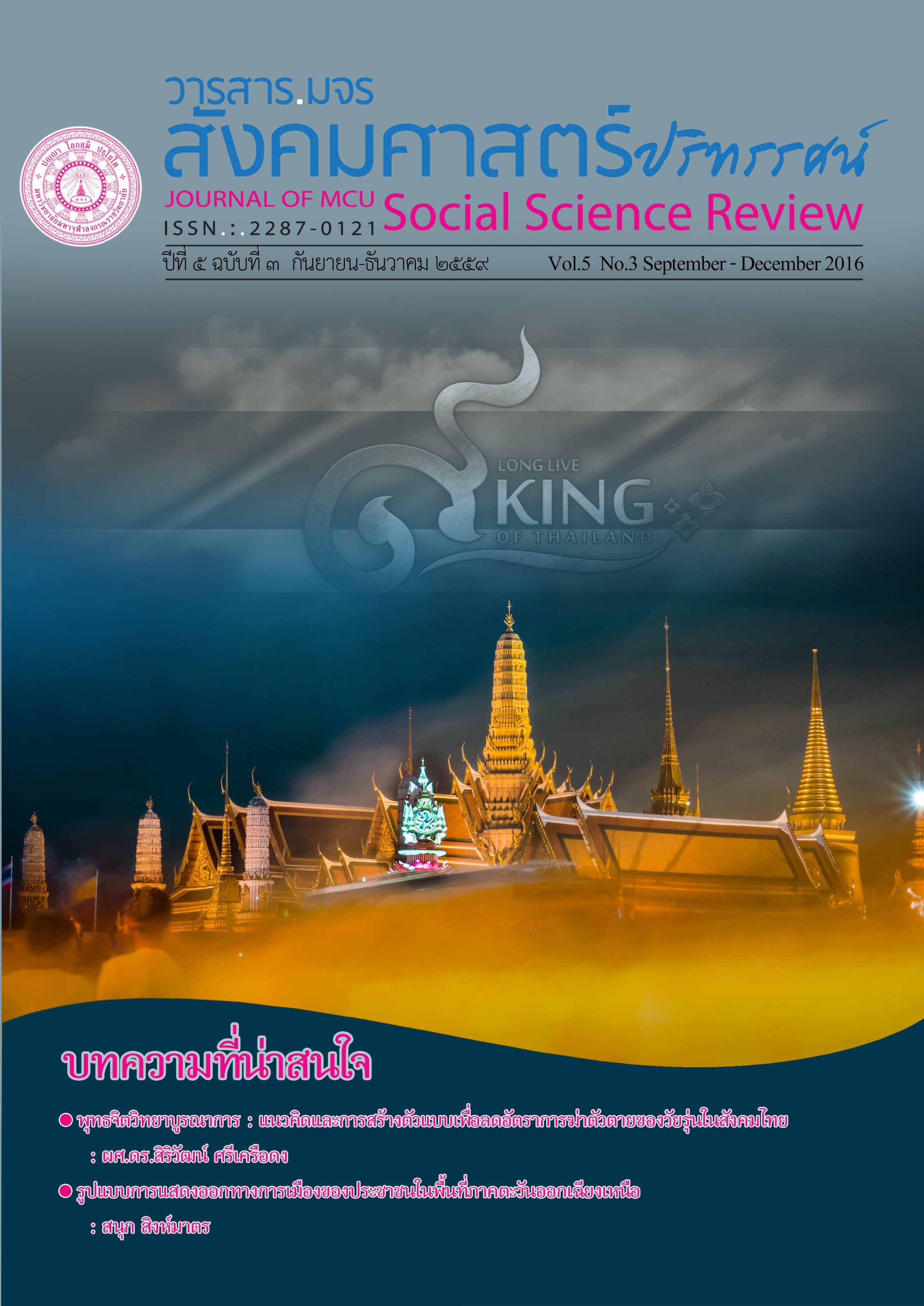การจัดการทุนมนุษย์เพื่อส่งเสริมจริยธรรมคุณธรรมของบุคลากร องค์กรปกครองส่วนท้องถิ่น
คำสำคัญ:
การจัดการทุนมนุษย์บทคัดย่อ
บทความวิจัยนี้มีวัตถุประสงค์เพื่อ ๑) เพื่อศึกษาแนวคิด ทฤษฎีเกี่ยวกับการจัดการทุนมนุษย์เพื่อส่งเสริมจริยธรรมคุณธรรม ๒) เพื่อศึกษาการจัดการทุนมนุษย์ในการส่งเสริมจริยธรรมของ
บุคลากรองค์กรปกครองส่วนท้องถิ่น และ ๓) เพื่อเสนอรูปแบบการจัดการทุนมนุษย์ในการส่งเสริมจริยธรรมคุณธรรมของบุคลากรองค์กรปกครองส่วนท้องถิ่น ซึ่งเป็นการศึกษาโดยการใช้การวิจัยแบบคุณภาพ โดยการศึกษาจากเอกสารและการสัมภาษณ์ผู้นาองค์กรปกครองส่วนท้องถิ่นในภาคตะวันออกเฉียงเหนือจานวน ๙ องค์กร แล้วนามาวิเคราะห์แบบอุปนัย โดยนาข้อมูลมาเรียบเรียงและจาแนกอย่างเป็นระบบ จากนั้นนามาตีความหมายเชื่อมโยงความสัมพันธ์และสร้างข้อสรุปจากข้อมูลต่างๆผลการวิจัยพบว่า รูปแบบการจัดการทุนมนุษย์ในการส่งเสริมจริยธรรมคุณธรรมของบุคลากรองค์กรปกครองส่วนท้องถิ่นจากการวิจัยสามารถกาหนดเป็นรูปแบบได้ ๓ รูปแบบดังนี้ ๑) รูปแบบการจัดการทุนมนุษย์ด้านความรู้นั้นองค์กรได้มีการจัดการประชุมบุคลากรในการเพิ่มศักยภาพด้านความรู้เกี่ยวกับเรื่องคุณธรรมจริยธรรมอย่างสม่าเสมอ มีการจัดฝึกอบรมบุคลากรจากวิทยากรที่มีความเชี่ยวชาญ จัดให้มีการศึกษาดูงานนอกสถานที่โดยเน้นไปหน่วยงานที่มีการบริหารจัดการเรื่องคุณธรรมจริยธรรมเป็นหลักเพื่อให้บุคลากรได้เพิ่มพูนความรู้เรื่องนี้ และจัดให้มีบุคลากรทางสงฆ์มาให้คาแนะนาเกี่ยวกับการส่งเสริมคุณธรรม
จริยธรรมให้กับบุคลากรในองค์กร ๒) รูปแบบการจัดการทุนมนุษย์ด้านความสามารถนั้นองค์กรได้จัดให้มีการเพิ่มทักษะในการปฏิบัติงานของบุคลการในองค์กร จัดให้มีโครงการพัฒนาการปฏิบัติงานของบุคลากรในองค์กร เพิ่มวินัยในการปฏิบัติงานของบุคลากรในองค์กรและผู้บริหารองค์กรต้องเป็นผู้นาที่ดีทางด้านความสามารถให้กับบุคลากรในองค์กร๓) รูปแบบการจัดการทุนมนุษย์ด้านความชานาญองค์กรได้มีการสนับสนุนจากผู้บริหาร วางแผนการดาเนินงานอย่างเป็นระบบ กระทาอย่างจริงจังและต่อเนื่อง และส่งเสริมให้บุคลากรมีการศึกษาต่อในระดับที่สูงขึ้น
เอกสารอ้างอิง
มัลลิกา คณานุรักษ์, รศ.. จิตวิยาการสื่อสารของมนุษย์. กรุงเทพมหานคร : โอ.เอส.พริ้นติ้ง
เฮ้าส์, ๒๕๔๗.
วิเชียร วิทยอุดม. ทฤษฎีองค์การ. พิมพ์ครั้งที่ 2. กรุงเทพมหานคร : บริษัทธีระฟิล์ม และ ไซเท็กซ์
จากัด, ๒๕๔๙.
อาภรณ์ ภู่วิทยพันธ์ุ. กลยุทธ์การพัฒนาทรัพยากรมนุษย์. กรุงเทพมหานคร : เอชอาร์ เซ็นเตอร์,
๒๕๕๑.
(๒) วารสาร:
ไพศาล เครือแสง. “รูปแบบการส่งเสริมจริยธรรมทางการบริหารตามหลักธรรมาภิบาลของผู้นา
องค์กรปกครอง ส่วนท้องถิ่นในเขตภาคเหนือตอนล่าง”. วารสาร มจร สังคมศาสตร์
ปริทรรศน์. ปีที่ ๔ ฉบับที่ ๑ มกราคม-เมษายน ๒๕๕๘.
ภาส ภาสสัทธา. “การบูรณาการหลักพุทธธรรมในการบริหารจัดการด้านความโปร่งใสขององค์กร
ปกครองส่วนท้องถิ่น”. วารสาร มจร สังคมศาสตร์ปริทรรศน์. ปีที่ ๔ ฉบับที่ ๓
กันยายน-ธันวาคม ๒๕๕๘.
ฌาน ตรรกวิจารณ์. “การพัฒนาทรัพยากรมนุษย์เชิงพุทธ”. ดุษฎีนิพนธ์ปริญญาปรัชญาดุษฎี
บัณฑิต. บัณฑิตวิทยาลัย : มหาวิทยาลัยรามคาแหง.
Abraham H.. Maslow. A Theory of Human Motivation. “Psychological Review, july
1943.
Douglas McGregor. The Human Side of Enterprise. New York : McGraw – Hill, 1960.
Lyman W. PorterandEdward E. LawlerIII.. Managerial Attitudes and Performance,
Homewood, III : Dorsey Press, 1968.
Torraco, R.J., Economic Human Capital Theory And Human Resource
Development. San Fracisco : Berrett - Koehler, 1998.
ดาวน์โหลด
เผยแพร่แล้ว
รูปแบบการอ้างอิง
ฉบับ
ประเภทบทความ
สัญญาอนุญาต
ลิขสิทธิ์ (c) 2016 วารสาร มจร สังคมศาสตร์ปริทรรศน์

อนุญาตภายใต้เงื่อนไข Creative Commons Attribution-NonCommercial-NoDerivatives 4.0 International License.
เพื่อให้เป็นไปตามกฎหมายลิขสิทธิ์ ผู้นิพนธ์ทุกท่านต้องลงลายมือชื่อในแบบฟอร์มใบมอบลิขสิทธิ์บทความให้แก่วารสารฯ พร้อมกับบทความต้นฉบับที่ได้แก้ไขครั้งสุดท้าย นอกจากนี้ ผู้นิพนธ์ทุกท่านต้องยืนยันว่าบทความต้นฉบับที่ส่งมาตีพิมพ์นั้น ได้ส่งมาตีพิมพ์เฉพาะในวารสาร มจร สังคมศาสตร์ปริทรรศน์ เพียงแห่งเดียวเท่านั้น หากมีการใช้ภาพหรือตารางหรือเนื้อหาอื่นๆ ของผู้นิพนธ์อื่นที่ปรากฏในสิ่งตีพิมพ์อื่นมาแล้ว ผู้นิพนธ์ต้องขออนุญาตเจ้าของลิขสิทธิ์ก่อน พร้อมทั้งแสดงหนังสือที่ได้รับการยินยอมต่อบรรณาธิการ ก่อนที่บทความจะได้รับการตีพิมพ์ หากไม่เป็นไปตามข้อกำหนดเบื้องต้น ทางวารสารจะถอดบทความของท่านออกโดยไม่มีข้อยกเว้นใดๆ ทั้งสิ้น





